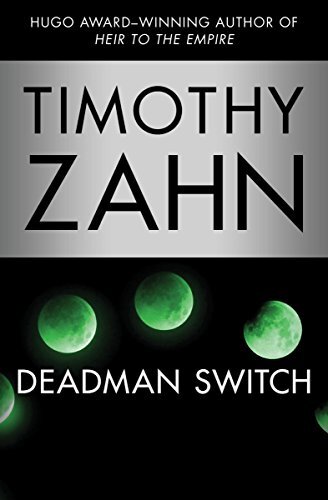Deadman Switch by Timothy Zahn Book Review
Deadman Switch by Timothy Zahn [Amazon link] is something a little different, a slow-burning but high-tension legal thriller wrapped up in science fiction dressings. It is also a multilayered story featuring anti-religious prejudice, providence, and the morality of lying. This particular work is more on the literary end of the adventure fiction spectrum, but it does have some traditional adventure elements to help keep things moving.

Deadman Switch By Timothy Zahn Open Road Media (October 16, 2012)
A major reason for the pace of the book is that its protagonist, Gilead Raca Benedar, is a man without the power to affect his environment. When a book is on the pulp end of the spectrum, protagonists tend to be in the mode of a romance, superior to both other men and their environment. Gilead, a member of a widely disliked religious minority in a largely secular society, lives his life at the sufferance of others.
He is not quick on the draw or the greatest star pilot in the galaxy. He does however have a remarkable ability, one that is the source of both the ire he faces from society and his livelihood. Gilead is a Watcher.
Watchers train their children from an early age to see. Their motivations are fundamentally religious in nature, seeking to appreciate God’s glory as manifested in this world. This is an entirely imaginable mental discipline, something like the kind of flexibility and balance and strength a lifelong practitioner of gongfu would enjoy, except that instead of training their bodies, they train their minds to see everything, instead of allowing mental models to fill in the gaps in perception. However, it turns out that their hyper-focused awareness produces an immense interpersonal advantage, as Watchers read the body language of others so astutely that it feels like they can read their minds.

Execution of the leaders of the Münster Rebellion
By Georg Berger - Federzeichnung aus Georg Berger, Contrafactur der Osnabrücker Bischöfe. Scan aus Abbildung in "Westfälische Kunststätten: Rathaus und Friedenssaal zu Münster", Seite 28, Public Domain, https://commons.wikimedia.org/w/index.php?curid=726654
That in and of itself would probably be enough to make others uncomfortable in their presence, but Gilead’s sect was involved in a rebellion with millenarian aspects a couple of decades ago. Wider society feels quite justified in their dislike of the Watchers. The multilayered low-grade persecution of Gilead’s people makes for a fascinating bit of background to the milleu.
Deadman Switch was originally published in 1988, and an interesting element is that the cultural references of its spacefaring society are mostly Russian. In 1988, the Soviet Union was still in business and the Berlin Wall was still standing, so while it is not perhaps so unusual to use the other superpower of the day as a reference point, it is unusual in that the Patri and its colony worlds are largely secular, but not at all Communist.
Jerry Pournelle imagined a future where Russia was a part of the coalition that conquered the stars, but in his CoDominium the Russians were as enthusiastically Orthodox as the Russians of the real world are again becoming. Neither Pournelle nor Zahn imagined Communism going forward, but they wrote sharply divergent paths for religion.
Pournelle was explicitly using Arnold Toynbee’s model of history in his CoDominium, but I don’t think Zahn was trying to make any kind of macrohistorical point. Gilead being intensely religious in a society that is mostly indifferent is simply an interesting source of tension for the book.
Not that a book whose central theme is the application of a technology that requires a direct human death each and every time it is used is lacking in tension. This is exacerbated by Gilead’s lack of power; he is almost entirely reliant on persuasion and artful misdirection to get anything done. Which is hard, when no one likes you.
In another author’s hands, I can see how this book could have easily become insufferably preachy. It is slow, and I think that is probably just in the nature of the kind of story that Zahn is trying to tell here. This isn’t the first time that Zahn has tried to tell a story of this sort, and Zahn’s ability to set the scene and create interesting characters hooked me strongly enough in the first few pages that I was willing to stick around and see how it all turned out. I think Zahn did a great job with this book, but I suspect it would bore readers to tears who like things fast-paced. If you are interested in science fiction with litfic aims that is wholly based however, then you may find this of interest.
My other book reviews | Reading Log
Other books by Timothy Zahn
New Thrawn series:
Thrawn
Thrawn: Alliances
Thrawn: Treason
Quadrail series:
Night Train to Rigel: Quadrail book 1 review
The Third Lynx: Quadrail book 2 review
Odd Girl Out: Quadrail book 3 review
The Domino Pattern: Quadrail book 4 review
Judgement at Proteus: Quadrail book 5 review
Original Thrawn Trilogy:
Heir to the Empire
Dark Force Rising
The Last Command
Blackcollar series:
The Blackcollar: Blackcollar series book 1 review
The Backlash Mission: Blackcollar series book 2 review
Dragonback series:
Dragon and Thief
Dragon and Soldier
Dragon and Slave
Dragon and Herdsman
Dragon and Judge
Dragon and Liberator

Comments ()